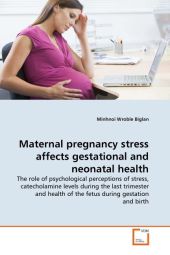 Neuerscheinungen 2010Stand: 2020-01-07 |
Schnellsuche
ISBN/Stichwort/Autor
|
Herderstraße 10
10625 Berlin
Tel.: 030 315 714 16
Fax 030 315 714 14
info@buchspektrum.de |

Minhnoi Wroble Biglan
Maternal pregnancy stress affects gestational and neonatal health
The role of psychological perceptions of stress, catecholamine levels during the last trimester and health of the fetus during gestation and birth
2010. 160 S.
Verlag/Jahr: VDM VERLAG DR. MÜLLER 2010
ISBN: 3-639-30943-X (363930943X)
Neue ISBN: 978-3-639-30943-0 (9783639309430)
Preis und Lieferzeit: Bitte klicken
The environmental demands during prenatal development have been implicated in the health issues in childhood and adulthood. Traditionally, women and physicians have focused attention on the ingestion of foods and drugs during pregnancy. However, psychosocial factors such as maternal stress may be as harmful as many of the drugs that have been the focus of prenatal care information (i.e., nicotine in cigarettes, cocaine, and caffeine) as many of the drugs that pregnant women are to restrain from consuming during pregnancy appear to cause changes in maternal chemistry in such a way to resemble a psychosocial stress response. Therefore, the current research examined psychological and physiological response to stress, independent of consumption of drugs like nicotine and caffeine. Data suggest that higher levels of norepinephrine and epinephrine at the beginning of the third trimester were associated with higher birth weight and shorter birth length, respectively. Although the data was limited in size of participants, the added evidence helps to support a role of the stress-response system (Sympathetic and HPA-axis) in the regulation and health of the fetus and neonate.
Minhnoi Wroble Biglan obtained a BS in Biology and Psychology at Carnegie Mellon University and a PhD in Health/Developmental Psychology at the University of Pittsburgh. Her research has examined the severity and duration of anxiety and stress during pregnancy on infant temperament, attention and memory, as well as later adolescent depression.


